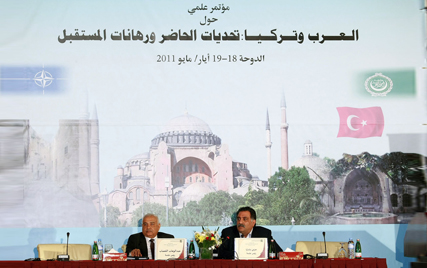 Dr. Azmi Bishara, general director of the Arab Center for Research and Policy Studies in Doha, opened a symposium titled "The Arabs and Turkey: Present Challenges and Future Prospects" in the Qatari capital on Wednesday. Put together by coordinator Abdulwahhab Al Qassab, the two-day proceedings were designed to provide an in-depth academic examination of the strategic relationship between Turkey and the Arab states, including the historical roots of the relationship and prospects for its future development.
Dr. Azmi Bishara, general director of the Arab Center for Research and Policy Studies in Doha, opened a symposium titled "The Arabs and Turkey: Present Challenges and Future Prospects" in the Qatari capital on Wednesday. Put together by coordinator Abdulwahhab Al Qassab, the two-day proceedings were designed to provide an in-depth academic examination of the strategic relationship between Turkey and the Arab states, including the historical roots of the relationship and prospects for its future development.
In his opening speech, Dr. Bishara stressed the significance of improving the Arabs' understanding of the interconnectedness involved. He also affirmed that the discussions would eventually expand to include Turkish participation once there had been a clearer articulation of Arab thinking on these matters. According to the ACRPS chief, there is a pressing need for the Arabs themselves to better define "who the Arabs are", and a clearer understanding of our relationships with other groups of people can only help in this process of self-discovery. It is in this context, he explained, that a series of similar academic symposia - on the theme of relations between the Arabs and the Other - are being hosted by the ACRPS following the "Arabs and Iran" conference held several months ago. The goal of these events is to pave the way for Arab writers, researchers and thinkers to contribute to the nation-building process at a time of far-reaching change across the Arab homeland.
Bishara, who welcomed the presence at the conference of a large number of Arab experts on Turkish affairs, enjoined all of them to continue to contribute to deeper Arab understanding of these relations, calling on them to enhance their cooperation with the center through academic and scholarly contributions about Turkey and the Arabs and the prospects for their future relations. He emphasized that the rise to power of Turkey's Justice and Development Party (AKP) had been a watershed moment in the country's modern history, with numerous repercussions for its foreign policy on the strategic level. Turkey's growing distance from the European Union during the AKP's second term, he pointed out, played a special role in this process.
Dr. Bishara also argued that Israel had failed to understand this transformation, as evidenced by its having sought to deal with Turkey as if nothing had changed. He said that certain "visible events" - such as that at the 2009 Davos Summit, when Turkish Prime Minister Recep Tayyep Erdogan publicly challenged Israeli President Shimon Peres, and the events surrounding the Freedom Flotilla Mavi Marmara - have demonstrated that Israel has not yet grasped these tectonic shifts in Turkish policy. This Israeli failure to appreciate Turkey's new role in the region, he added, has provided an opportunity for the Arab states to make the most of a new situation and build a different paradigm for their relationship with Turkey. Dr. Bishara pointed to the coming seven years as a period during which the Arab peoples would become the primary factor in shaping the policies of their governments, creating space for a new series of regional alliances and coalitions which would enable these peoples to shape their connections with Turkey and other neighbors. The general director went on to emphasize the importance of the participants' and other intellectuals' maintaining their links with what is happening in the Arab countries in order to further the broader aims of both Arab self-understanding and understanding the future prospects of relations with others.
Coordinator Qassab began the proceedings by delving into what the Arabs and Turkey had in common in light of recent transformations in the Arab world. He also defined the historical aspect of Turkish-Arab relations as an invaluable starting point from which to evaluate the current and future status of these ties, and expressed his hope that the symposium could be an effective venue for Arab academics and intellectuals to begin to elucidate the future axes of closer bonds with Turkey.